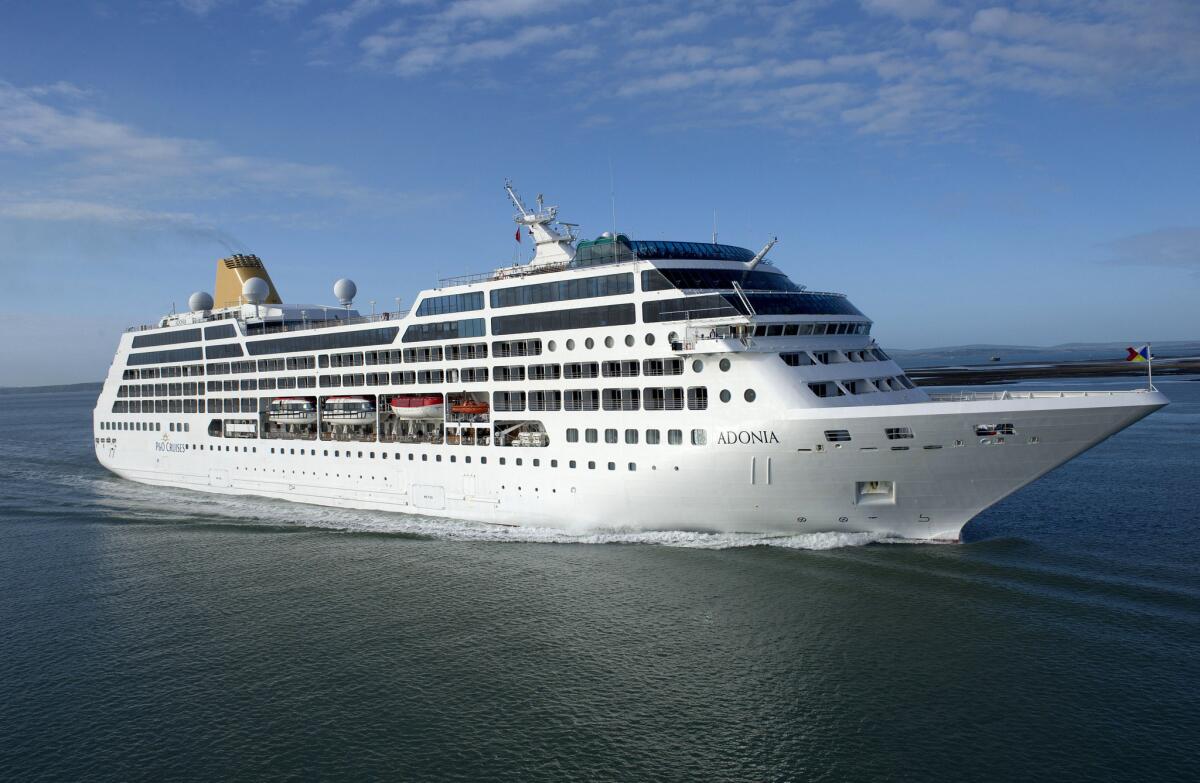Cuba allows expats to arrive by sea, freeing Carnival to cruise there

This undated file photo provided by Carnival Corp. shows the 710-passenger Adonia ship. Starting in May, Carnival is offering trips from Miami to Cuba through its new brand, Fathom.
- Share via
Protesting crowds, chiding politicians and lawsuit-filing consumers in the U.S. weren’t enough to sway Cuba from its insistence that expatriates wouldn’t be allowed to return by sea.
But following Carnival Corp.’s threat to delay its inaugural Miami-Havana cruise until travelers born on the island were welcome to come along, the Cuban government reacted Friday by throwing the Cold War-era ban overboard.
The news, announced on Cuba’s state media, clears the way for the Adonia, which sails under Carnival’s Fathom brand, to head for open water as scheduled May 1, the first cruise ship to journey from the U.S. to Cuba in more than 50 years.
Carnival Chief Executive Arnold Donald attributed the change of heart to fervent negotiations between Carnival representatives and the communist government.
“This is a positive outcome and we are extremely pleased,” Donald said. “We want to extend our sincere appreciation to Cuba and to our team who worked so hard to help make this happen.”
Experts on Cuba say the country dropped the restriction primarily out of fear of losing out future tourism dollars spent by American visitors now that Cuba and the U.S. have agreed to improve relations and ease travel restrictions.
“Given the fact that Cuba has not identified other sources of capital, tourism is the mainstay of the economy, and they are clearly looking at the U.S. market,” said Jorge Duany, director of the Cuban Research Institute and professor of anthropology at Florida International University.
Travel and tourism generated at least $8.2 billion, or 10% of Cuba’s gross domestic product, in 2014 and supported 124,000 jobs, according to the World Travel and Tourism Council, a London nonprofit that researches the global effect of tourism.
The council predicts that tourism will increase its impact on the Cuban economy by 4.4% each year through 2025.
When Carnival started accepting deposits for the May 1 cruise, the Miami-based cruise company announced that it would abide by Cuba’s restriction and would accept no Cuban-born passengers.
“Cuba has a long-standing regulation that no Cuban-born individuals are allowed to travel from anywhere in the world to and from Cuba by ship,” Carnival spokesman Roger Frizzell said last week. “This regulation applies to all cruise lines, ferries and any form of shipping planning to travel to and from Cuba.”
But that decision generated protests in Miami, complaints by politicians and a federal lawsuit against Carnival, accusing the company of violating the civil rights of Cuban-born travelers.
Carnival reversed its position, announcing Monday that it would sell tickets to all passengers, even Cuban-born travelers, and vowed to delay the May 1 sailing until Cuba removed the ban.
In Havana, state media reported Friday that the government had lifted the ban as part of a broader shift in policy to normalize relations between Cuba and the U.S.
The Cuban government said the restrictions on Cuban-born travelers arriving on the island by ship dates back to seaborne attacks by Cuban exiles shortly after the Cuban revolution. Cuba has no such restrictions on Cuban-born travelers arriving by air.
“This policy change was the right thing to do,” said Miami-Dade County Mayor Carlos Gimenez, who was critical of Carnival’s previous policy. He added that the shift is “probably one of the very few times that a corporation has successfully negotiated the changing of a policy with the Cuban government.”
Other U.S.-based cruise lines are trying to negotiate with Cuba to begin service to the island nation as well.
“I think it’s a positive step by all accounts,” said Duany, who was born in Cuba.
The U.S. still requires that Cuba-bound travelers visit for one of 12 reasons, such as professional research, public performances or family visits. Fathom officials say they will ensure that passengers meet the U.S. conditions.
In addition, Cuban-born travelers are required to either have a Cuban passport or an HE-11 visa, which can take more than a month to process, is valid for a one-time entry for 30 days and expires within 90 days of issue.
The 704-passenger Adonia is set to sail on a weeklong cruise, stopping first in Havana, then Cienfuegos and Santiago de Cuba.
Fathom executives say demand for the cruise is strong.
“We are ecstatic that this historic opportunity is open to everyone who wants to travel to Cuba,” Fathom President Tara Russell said.
As part of the efforts by the Obama administration and the Cuban government to ease travel restrictions, the U.S. Department of Transportation is considering applications from United, American, Southwest, JetBlue and other airlines to launch 20 daily round-trip flights to Havana, and 10 flights to nine smaller airports across Cuba.
hugo.martin@latimes.com
More to Read
Inside the business of entertainment
The Wide Shot brings you news, analysis and insights on everything from streaming wars to production — and what it all means for the future.
You may occasionally receive promotional content from the Los Angeles Times.











